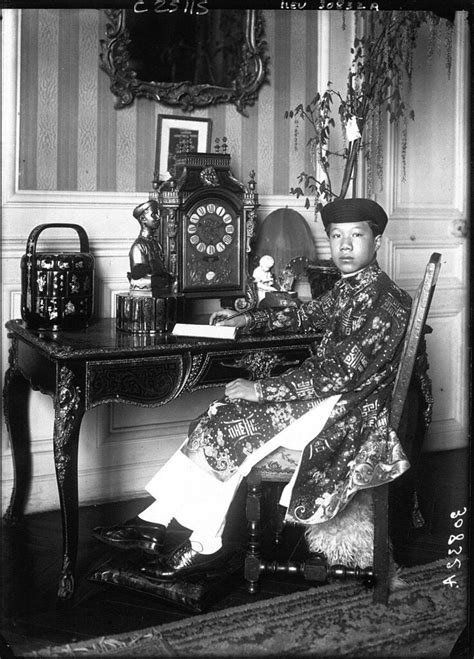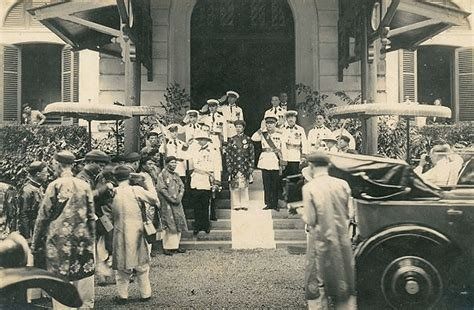The Abdication of Emperor Bảo Đại and Its Significance for the August Revolution and Vietnamese History
The success of the August Revolution led to the establishment of the Democratic Republic of Vietnam, now the Socialist Republic of Vietnam, marking a glorious milestone in the nation’s history of struggle for independence. A significant event during the climax of the August Revolution was the abdication of Emperor Bảo Đại on August 30, 1945, in the imperial capital of Huế.

Bảo Đại – The Last Emperor of Vietnam
Emperor Bảo Đại, whose real name was Nguyễn Phúc Vĩnh Thụy, was born on October 22, 1913. He was the only son of Emperor Khải Định and Empress Dowager Đoan Huy. In 1922, Vĩnh Thụy was proclaimed Crown Prince and sent to France for education. After Emperor Khải Định passed away on January 8, 1926, Vĩnh Thụy ascended the throne under the title Bảo Đại, becoming the 13th emperor of the Nguyễn Dynasty in Vietnamese history. However, he returned to France to continue his studies and only officially took the throne in 1933.
Despite being the emperor, Bảo Đại had no real power, as the French completely controlled the government. The Nguyễn court was merely a puppet administration, with its officials receiving salaries like colonial employees. Bảo Đại indulged in a hedonistic lifestyle, spending his time hunting with beautiful women in the jungles of Quảng Trị and the Central Highlands or gambling in casinos in Macau and Monaco. He gained a reputation as a playboy comparable to Arab princes or European royalty.
The August Revolution and Bảo Đại’s Abdication
After Japan overthrew French rule in Vietnam on March 9, 1945, Bảo Đại’s administration collaborated with the Japanese militarists to suppress the people’s revolutionary movements. However, on August 15, 1945, amid the nationwide uprising, Japan surrendered to the Allied forces, marking the end of World War II.
Following the directive of the National Uprising Committee, the Thừa Thiên-Huế Provincial Party Committee launched an uprising to seize power. Phạm Khắc Hòe, the emperor’s Chief of Staff, was assigned the task of persuading Bảo Đại to abdicate.
On August 17, Bảo Đại issued Decree No. 105, agreeing to transfer power to the Việt Minh while still hoping to retain the throne by inviting Việt Minh leaders to Huế to form a new cabinet. However, on August 22, he received a telegram from the National Liberation Committee stating:
“In the face of the unified will of the entire Vietnamese people, ready to sacrifice everything to save national independence, we earnestly ask Your Majesty to make a historic gesture by renouncing the throne.”
Realizing the overwhelming revolutionary momentum and the people’s aspirations, Bảo Đại made the wisest decision of his life—to abdicate voluntarily. He expressed his willingness to sacrifice all his privileges for the common cause and requested the National Liberation Committee to come to Huế for the official handover.
On August 25, 1945, a delegation from the National Liberation Committee, including Trần Huy Liệu, Nguyễn Lương Bằng, and Cù Huy Cận, traveled to Huế to oversee Bảo Đại’s abdication. That same day, during a council meeting at Kiến Trung Palace, Bảo Đại reviewed the Abdication Proclamation drafted by Phạm Khắc Hòe. The proclamation emphasized national unity:
“Unity means survival, division means death. All classes, parties, and even members of the royal family must unite to fully support the Democratic Republic government in preserving national independence.”
As for himself, Bảo Đại stated:
“After twenty years of enduring the bitterness of the throne, I now rejoice in becoming a free citizen of an independent nation.”
He also made three requests to the revolutionary government:
- No discrimination against members of the royal family and court officials.
- Allow former court officials to serve the country based on their abilities and circumstances.
- Respect and preserve the Nguyễn Dynasty’s tombs and temples.
The Historic Abdication Ceremony
On the afternoon of August 30, 1945, the abdication ceremony was held at the Ngọ Môn Gate in Huế, attended by tens of thousands of people. Accompanied by Phạm Khắc Hòe and Prince Vĩnh Cẩn, Bảo Đại, dressed in imperial robes, read his abdication statement. The yellow flag of the Nguyễn Dynasty was lowered from the Flag Tower, and the red flag with a yellow star—the new national flag—was hoisted amid thunderous applause, cheers, and celebratory gunfire.
Bảo Đại then formally handed over the imperial seal and sword to the representatives of the Provisional Government, officially becoming an ordinary citizen of the Democratic Republic of Vietnam. The government delegation, represented by Trần Huy Liệu, Nguyễn Lương Bằng, and Cù Huy Cận, accepted Bảo Đại’s abdication and received the golden imperial seal and the jade-encrusted sword.
Trần Huy Liệu then delivered a speech emphasizing that the victory of the August Revolution was the result of the people’s long and arduous struggle. He declared the abolition of the monarchy not only in Huế but across Vietnam and highlighted the Democratic Republic’s policy of national unity. The massive crowd chanted slogans such as “Long live independent Vietnam!” and “Long live the Democratic Republic of Vietnam!” Nguyễn Lương Bằng then presented Vĩnh Thụy with a badge featuring the red flag with a yellow star, symbolizing his new status as a citizen of the independent nation.
The Significance of Bảo Đại’s Abdication
Bảo Đại’s abdication was a momentous event in Vietnamese history. It marked the definitive end of the feudal monarchy that had lasted over a millennium and indirectly legitimized the new people’s government. By voluntarily stepping down, Bảo Đại acknowledged and conformed to the unstoppable revolutionary force of the people. His abdication also eliminated a potential political tool that foreign imperialist and reactionary forces could have exploited to oppose the new government and reimpose colonial rule.
Furthermore, Bảo Đại’s peaceful abdication added to the humanitarian and peaceful nature of the August Revolution. In other revolutions, deposed monarchs were often executed (as in the French Revolution of 1789 and the Russian Revolution of 1917), or political factions engaged in prolonged internal conflict. In contrast, Vietnam’s revolution saw minimal party divisions, and different social classes quickly united for national independence. Bảo Đại’s abdication thus symbolized the completion of an 87-year-long struggle (1858-1945) against colonialism, feudalism, and fascism.
In conclusion, the abdication of Bảo Đại—the last emperor of the Nguyễn Dynasty—was a pivotal moment in Vietnam’s history. It officially ended feudalism and paved the way for a new democratic republic.

Bảo Đại’s Life After Abdication
After stepping down and becoming a citizen of the independent nation, Nguyễn Phúc Vĩnh Thụy was treated with great respect by the Democratic Republic of Vietnam. President Hồ Chí Minh personally invited him to serve as the Supreme Advisor to the Provisional Government and as a member of the Constitutional Drafting Committee. In January 1946, Vĩnh Thụy was elected as a representative in the first National Assembly.
Later, Hồ Chí Minh suggested that Vĩnh Thụy travel to China, France, the United Kingdom, and the United States to introduce Vietnam’s new regime and seek international recognition of its independence. However, despite Hồ Chí Minh’s trust, Vĩnh Thụy, being weak-willed, succumbed to financial difficulties and the schemes of French intelligence agents. He was eventually persuaded by the French to become their puppet ruler once again. In 1954, he was deposed by Ngô Đình Diệm and lived in exile abroad until his death in 1997.
